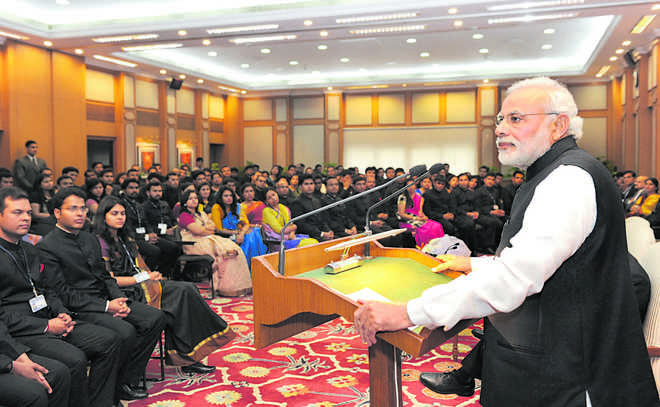On Independence Day, we heard the Prime Minister saying that his government’s motto is to reform, perform and transform. On September 1, Carnegie Endowment for International Peace wrote, “India’s economy has grown rapidly in recent years, but the country’s bureaucratic quality is widely perceived to be either stagnant or in decline”.
It is time to relook at overhauling the bureaucracy, if we wish to realise Modi’s idea of India. We need speed, we need efficiency and we need effectiveness in our entire chain of command. This is the pre-requisite in realising the vision.
We have had a mixed bag of experience with the bureaucracy in implementing some of the key announcements from the Prime Minister, and the commitment on budget announcements. I present here an appraisal and certain suggestions to address some of the issues with our bureaucracy.
First, a look at the reasons why the bureaucracy fails:
nUnlike the politician, who has to go to the electorate every five years seeking votes as his ‘appraisal’ for the performance, bureaucrats come with a seniority-based promotion and a defined retirement age, and hence they are least bothered about their performance reviews. Even these Annual Confidential Reports (ACRs) are often ‘managed’.
nMost of the bureaucrats’ approach is to ‘control’ and ‘govern’, and not ‘work as a team’ for development.
nThe majority of bureaucrats work for themselves. And then, there are egos, differences, grudges and dislikes for fellow bureaucrats. So there is never a ‘team approach’ in whatever they do and this drags the performance of the government.
nOur bureaucracy is more ‘procedure driven’ than ‘outcome driven’. Famously, one of the best performing ministers, Nitin Gadkari, said on May 9 that it took him a nine-month wait for an approval for an automated parking. This is when Gadkari is known for being really fast in getting things done with the bureaucracy. We can well imagine what other ministers must be facing.
An overhaul of the system is thus obviously due. Our biggest failures will be because of the inefficient and unaccountable bureaucracy.
As of now, we have an appraisal system that looks at ACRs, which only accounts for an individual’s performance. If the performance and payment of the bureaucrat were based not just on his individual performance, but also the performance of his department/ministry and the overall performance of the government, then the bureaucrats would work as a team and give up the silo approach. So the first change required is a move from ACR to CPR (Comprehensive Performance Review), which includes:
nIndividual Performance Review (IPR): (50% weightage) Based on the yearly goals/deliverables assigned.
nDepartment’s Performance Review (DPR): (25% weightage) Overall departmental review be based on the goals set for the year for the department/ministry.
nGovernment Performance Review (GPR): (25% weightage) This is the overall performance rating of the government based on (a) fact/data-based self-assessment by the ministry/department (10% weightage) and (b) annual online survey taken by the citizens, for all departments/ministries at the Central level (15 % weightage).
Next, increments, variable pay/incentives and promotions of officials should be based on the CPR thus arrived at. The implementation can be in a phased manner, starting with the secretaries, then joint secretaries and then the director level.
A major change in bureaucracy would be moving to a ‘performance-based contractual service’. The biggest bane of bureaucracy is their job security. When politicians have to go every five years for their performance review and for renewing their term before the electorate, why should the top officials not undergo a review and renewal based on their performance?
All officers of the rank of joint secretary and above must be put on a five-year contract, based on their performance review, with a performance-based financial incentive. The salary structure should have a fixed pay and a variable component. If they fail to live up to the performance standards (IPR) of at least 80% for three years (out of a five-year term), they must be relieved of their service. Let us not forget that the ‘best are first to be hired and last to be fired’.
Even, Nirmal Kumar Mukarji, the last serving Indian Civil Service (ICS) officer who retired as Cabinet Secretary in 1980, while speaking as chief guest at the Indian Administrative Service’s 50th anniversary celebrations in 1997, had called for an end to the all-India tenured services.
A private secretary (PS) to a minister is considered an important bureaucrat, but he is a junior IAS officer (below the rank of joint secretary), and hence he plays safe while dealing with his seniors, as one day he might have to work under them. The loser in this case always is the minister. We thus need to consider that the PS to a minister should be a special-secretary-rank officer.
Modi rightly said recently, “We cannot march through the 21st century with the administrative systems of the 19th century”. It is noteworthy that we still have ‘collectors’ in post-British India; this itself shows that the bureaucracy is still in the 19th century! A senior IAS wrote to me, “Modi is ahead of time”, and I said, “Yes, Modi is definitely ahead of time, but unfortunately, the bureaucracy is still in the 19th century.” When Modi was thinking of the Planning Commission, he made a profound statement, “Sometimes it is better to build a new house than to repair the old one.” May be the same approach is needed for the ‘institution’ called bureaucracy. The transition is critical and we have no time to lose, and there should be a time-bound plan to implement it.
The writer is a public policy expert.
Unlock Exclusive Insights with The Tribune Premium
Take your experience further with Premium access.
Thought-provoking Opinions, Expert Analysis, In-depth Insights and other Member Only Benefits
Already a Member? Sign In Now










